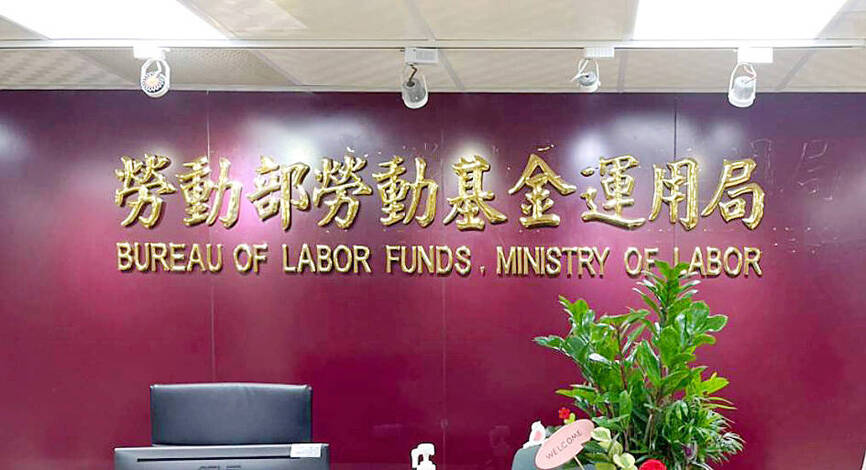The Bureau of Labor Insurance yesterday said that it has started distributing earnings from the Labor Pension Fund’s nearly NT$700 billion (US$21.3 billion) record-high gains to the personal accounts of about 12.92 million participants in the fund, with more than 50 percent pocketing more than NT$20,000 each.
About 7.49 million workers, or 58 percent of the total number of employees enrolled in the fund, received more than NT$20,000 each from the fund’s NT$698.97 billion gains last year, it said.
Another 4.67 million workers, or 36.2 percent, received more than NT$50,000 each, it added.

Photo: Lee Chin-hui, Taipei Times
The bureau also reported that the funds it manages posted gains of NT$108.7 billion in January — which translated into a rate of return of 1.61 percent — aided by a global financial market boom due in part to better US economic data.
However, the boom in global financial markets was offset to some extent by the emergence of Chinese artificial intelligence (AI) start-up DeepSeek (深度求索) and its alleged low-cost AI model, which raised concerns over investments in the technology, the bureau said.
Bureau data showed that 57.33 percent of the labor funds were invested overseas in January, while the remaining 42.67 percent were invested domestically.
The combined value of the funds — which includes the Labor Pension Fund, the Labor Retirement Fund, the Labor Insurance Fund, the Employment Insurance Fund and the Arrear Wage Payment Fund — totaled NT$7.13 trillion as of the end of January.
The value of assets in the new Labor Pension Fund, launched in 2015, totaled NT$4.68 trillion, the highest among the funds, with a rate of return of 1.47 percent for January, the bureau said.
The Labor Retirement Fund, established in 1984, had about NT$1.07 trillion in assets, with a rate of return of 2.3 percent.
People can check their pension allocations via the bureau’s online system at edesk.bli.gov.tw/me/#/na/login or in-person at any local bureau office, it said.
Those who have accounts with Taiwan Cooperative Bank (合庫銀行), E. Sun Bank (玉山銀行), Taishin Bank (台新銀行), Taipei Fubon Bank (台北富邦銀行), First Bank (第一銀行) or Chunghwa Post (中華郵政) can check their latest profit allocations at ATMs starting today, as the distribution takes time to process, the bureau said.
Distribution of the earnings from last year would be completed by the end of this month, it added.
Additional reporting by Lee Ching-hui and Sam Garcia

Conflict with Taiwan could leave China with “massive economic disruption, catastrophic military losses, significant social unrest, and devastating sanctions,” a US think tank said in a report released on Monday. The German Marshall Fund released a report titled If China Attacks Taiwan: The Consequences for China of “Minor Conflict” and “Major War” Scenarios. The report details the “massive” economic, military, social and international costs to China in the event of a minor conflict or major war with Taiwan, estimating that the Chinese People’s Liberation Army (PLA) could sustain losses of more than half of its active-duty ground forces, including 100,000 troops. Understanding Chinese

The Ministry of Foreign Affairs (MOFA) yesterday said it is closely monitoring developments in Venezuela, and would continue to cooperate with democratic allies and work together for regional and global security, stability, and prosperity. The remarks came after the US on Saturday launched a series of airstrikes in Venezuela and kidnapped Venezuelan President Nicolas Maduro, who was later flown to New York along with his wife. The pair face US charges related to drug trafficking and alleged cooperation with gangs designated as terrorist organizations. Maduro has denied the allegations. The ministry said that it is closely monitoring the political and economic situation

UNRELENTING: China attempted cyberattacks on Taiwan’s critical infrastructure 2.63 million times per day last year, up from 1.23 million in 2023, the NSB said China’s cyberarmy has long engaged in cyberattacks against Taiwan’s critical infrastructure, employing diverse and evolving tactics, the National Security Bureau (NSB) said yesterday, adding that cyberattacks on critical energy infrastructure last year increased 10-fold compared with the previous year. The NSB yesterday released a report titled Analysis on China’s Cyber Threats to Taiwan’s Critical Infrastructure in 2025, outlining the number of cyberattacks, major tactics and hacker groups. Taiwan’s national intelligence community identified a large number of cybersecurity incidents last year, the bureau said in a statement. China’s cyberarmy last year launched an average of 2.63 million intrusion attempts per day targeting Taiwan’s critical

‘SLICING METHOD’: In the event of a blockade, the China Coast Guard would intercept Taiwanese ships while its navy would seek to deter foreign intervention China’s military drills around Taiwan this week signaled potential strategies to cut the nation off from energy supplies and foreign military assistance, a US think tank report said. The Chinese People’s Liberation Army (PLA) conducted what it called “Justice Mission 2025” exercises from Monday to Tuesday in five maritime zones and airspace around Taiwan, calling them a warning to “Taiwanese independence” forces. In a report released on Wednesday, the Institute for the Study of War said the exercises effectively simulated blocking shipping routes to major port cities, including Kaohsiung, Keelung and Hualien. Taiwan would be highly vulnerable under such a blockade, because it